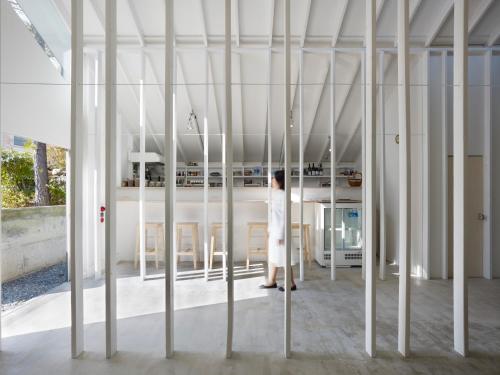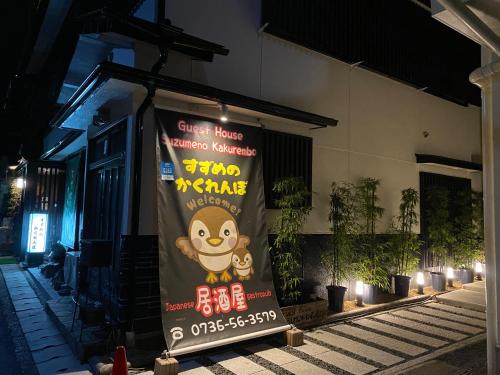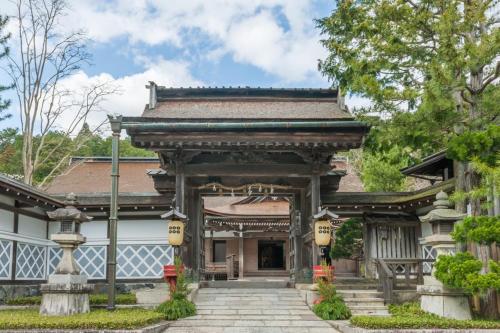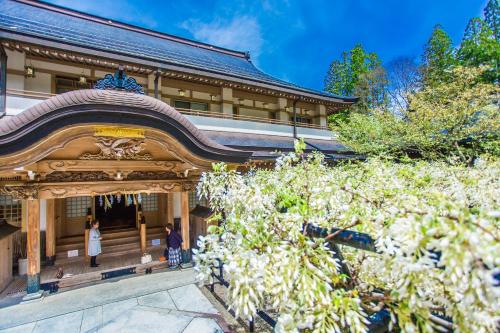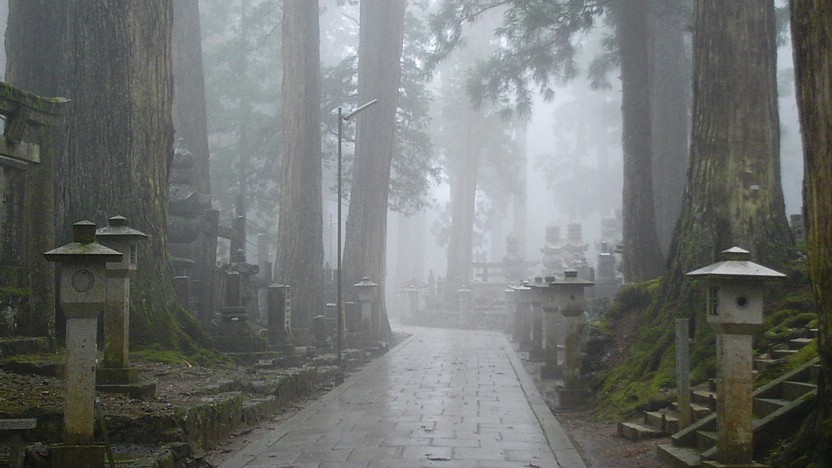
Okunoin (Μ@) is the site of the mausoleum of Kobo Daishi (also known as Kukai), the founder of Shingon Buddhism and one of the most revered persons in the religious history of Japan. Instead of having died, Kobo Daishi is believed to rest in eternal meditation as he awaits Miroku Nyorai (Maihreya), the Buddha of the Future, and provides relief to those who ask for salvation in the meantime. Okunoin is one of the most sacred places in Japan and a popular pilgrimage spot.
The Ichinohashi Bridge (first bridge) marks the traditional entrance to Okunoin, and visitors should bow to pay respect to Kobo Daishi before crossing it. Across the bridge starts Okunoin's cemetery, the largest in Japan, with over 200,000 tombstones lining the almost two kilometer long approach to Kobo Daishi's mausoleum. Wishing to be close to Kobo Daishi in death to receive salvation, many people, including prominent monks and feudal lords, have had their tombstones erected here over the centuries.
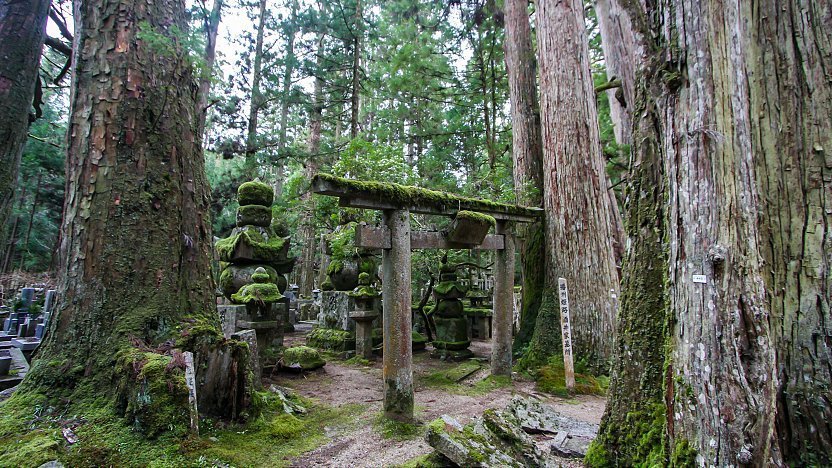
A second, shorter approach to Okunoin, which is used by the majority of visitors these days, starts at the Okunoin-mae bus stop and cuts the walk to the mausoleum in half (to slightly under a kilometer). This alternative route leads through a more recent addition to the cemetery with modern tombstones by individuals, associations and companies, including some surprising ones, such as a pest control company's memorial to all the termites that their products have been exterminating.
Regardless of which approach you choose, both paths meet up at the Gokusho Offering Hall which lies near a row of statues depicting Jizo, a popular Bodhisattva that looks after children, travelers, and the souls of the deceased. Visitors make offerings and throw water at the statues, known as Mizumuke Jizo (Water Covered Jizo) to pray for departed family members.

The Gobyobashi Bridge crosses a stream behind the Mizumuke Jizo that separates the innermost grounds of the temple from the rest of Okunoin. Visitors should again bow to Kobo Daishi before crossing, and photography, food and drink are forbidden beyond this point. To the left of the bridge are a group of wooden markers placed in the stream as a memorial to unborn children.
A few meters past the bridge on the left side of the path lies the Miroku Stone, housed in a small cage. Visitors are challenged to lift the stone from the cage's lower platform to an upper platform with only one hand. It is believed that the stone feels lighter to good people and heavier to bad people, and that it can provide a connection to the Miroku Bodhisattva.
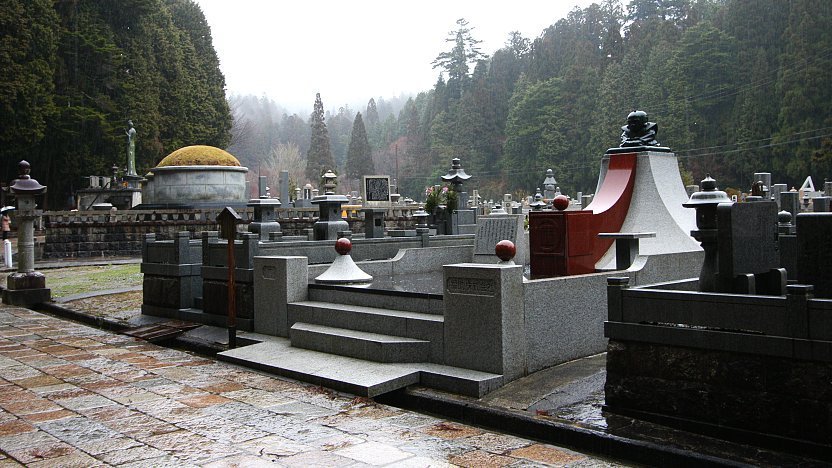
Torodo Hall (Hall of Lamps; note that the hall is undergoing renovations from late September 2024 for about one year, during which it may not be possible to see the lanterns) is Okunoin's main hall for worship, built in front of Kobo Daishi's mausoleum. Inside the hall are more than 10,000 lanterns, which were donated by worshipers and are kept eternally lit. In the hall's basement are 50,000 tiny statues that have been donated to Okunoin on the occasion of the 1150th anniversary of Kobo Daishi's entrance into eternal meditation in 1984.
Behind Torodo Hall is Kobo Daishi's Mausoleum (Gobyo), the site of his eternal meditation. Visitors come from all over to pray to Kobo Daishi, and it is not uncommon to see pilgrims chanting sutras here.
Some guidebooks suggest visiting Okunoin's graveyard at night. A night time visit indeed provides a special atmosphere that is quite different from that of a day time visit, but note that some parts of the path are poorly lit. It is possible to venture all the way to the mausoleum during the night, but neither the Torodo Hall nor any of the the other offering halls are open. Also, please behave respectfully and keep in mind that photography, food and drink are prohibited beyond the Gobyobashi Bridge.
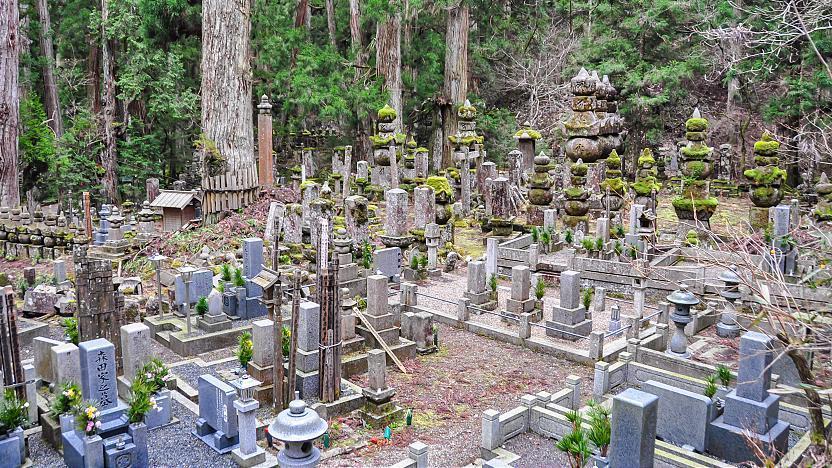
Getting there and around
The Ichinohashi Bridge is a 10-15 minute walk or short bus ride (160 yen) from the Senjuinbashi intersection at the town center. From the bus stop, it is about a two kilometer walk to the mausoleum along the traditional approach through the graveyard.
Okunoin-mae bus stop is the final stop of the main bus line that connects Okunoin with the town center (Senjuinbashi) and the cablecar station. The bus ride takes 20 minutes and 610 yen from the cablecar station or 10 minutes and 270 yen from the town center. There are 2-3 buses per hour. From the bus stop, it is about a one kilometer walk to the mausoleum through a newer part of the graveyard.
How to get to and around Koyasan

Hours and Fees
Torodo (Hall of Lanterns)
Hours
Closed
Admission
Questions? Ask in our forum.
Hotels around Mount Koya
-
-
![]() Guest House hachi hachiOffering quiet street views, Guest House hachi hachi is an accommodation situated in Koyasan, 37 km from Kishi Station and 43 km from Matsushita Park. The 1-star guest house has air-conditioned rooms with a shared bathroom and free WiFi. The accommodation features full-day security and bicycle parking for guests. At the guest house, each unit includes a desk. The units are equipped with heating facilities. A continental breakfast is available at the guest house. A bicycle rental service is available at Guest House hachi hachi. Wanpaku Park is 45 km from the accommodation, while Kii Fudoki No Oka Museum of Archaeology and Folklore is 46 km from the property. Kansai International Airport is 60 km away.View on Booking.com
Guest House hachi hachiOffering quiet street views, Guest House hachi hachi is an accommodation situated in Koyasan, 37 km from Kishi Station and 43 km from Matsushita Park. The 1-star guest house has air-conditioned rooms with a shared bathroom and free WiFi. The accommodation features full-day security and bicycle parking for guests. At the guest house, each unit includes a desk. The units are equipped with heating facilities. A continental breakfast is available at the guest house. A bicycle rental service is available at Guest House hachi hachi. Wanpaku Park is 45 km from the accommodation, while Kii Fudoki No Oka Museum of Archaeology and Folklore is 46 km from the property. Kansai International Airport is 60 km away.View on Booking.com -
![]() Koyasan Guesthouse KokuuLocated just 40 km from Kishi Station, Koyasan Guesthouse Kokuu offers accommodation in Koyasan with access to a terrace, a bar, as well as luggage storage space. It is set 45 km from Subaru Hall and features bicycle parking. The guest house provides rooms with air conditioning, free private parking and free WiFi. For added convenience, the property can provide towels and linens for a supplement. At the guest house, every unit includes a shared bathroom with slippers. A continental breakfast is available at the guest house. The area is popular for hiking, and bike hire is available at this 1-star guest house. Matsushita Park is 47 km from Koyasan Guesthouse Kokuu. Kansai International Airport is 63 km away.View on Booking.com
Koyasan Guesthouse KokuuLocated just 40 km from Kishi Station, Koyasan Guesthouse Kokuu offers accommodation in Koyasan with access to a terrace, a bar, as well as luggage storage space. It is set 45 km from Subaru Hall and features bicycle parking. The guest house provides rooms with air conditioning, free private parking and free WiFi. For added convenience, the property can provide towels and linens for a supplement. At the guest house, every unit includes a shared bathroom with slippers. A continental breakfast is available at the guest house. The area is popular for hiking, and bike hire is available at this 1-star guest house. Matsushita Park is 47 km from Koyasan Guesthouse Kokuu. Kansai International Airport is 63 km away.View on Booking.com -
![]() Guest House Suzumeno KakuremboFeaturing 2-star accommodation, Guest House Suzumeno Kakurembo is set in Koyasan, 37 km from Kishi Station and 44 km from Matsushita Park. Among the facilities of this property are a restaurant, full-day security and luggage storage space, along with free WiFi. Jigenin Temple is 47 km from the guest house and Subaru Hall is 48 km away. At the guest house, some units are soundproof. Wanpaku Park is 46 km from the guest house, while Kii Fudoki No Oka Museum of Archaeology and Folklore is 46 km away. Kansai International Airport is 60 km from the property.View on Booking.com
Guest House Suzumeno KakuremboFeaturing 2-star accommodation, Guest House Suzumeno Kakurembo is set in Koyasan, 37 km from Kishi Station and 44 km from Matsushita Park. Among the facilities of this property are a restaurant, full-day security and luggage storage space, along with free WiFi. Jigenin Temple is 47 km from the guest house and Subaru Hall is 48 km away. At the guest house, some units are soundproof. Wanpaku Park is 46 km from the guest house, while Kii Fudoki No Oka Museum of Archaeology and Folklore is 46 km away. Kansai International Airport is 60 km from the property.View on Booking.com -
![]() Koyasan Shukubo YochiinLocated in the sacred Mount Koya area, μR hV χr@ -Koyasan Shukubo Yochiin- is a historic temple and an accommodation for visitors. Just to the left of entering sanmon gate, there is a stone garden created by the famous Mirei Shigemori and designated a natural monument by the Japanese government. Guests can experience temple activities such as meditation, sutra copying and tracing of Buddhist deities at an additional charge, if reserved in advance. Guests can also participate in morning prayers, which do not require reservation. All rooms at μR hV χr@ -Koyasan Shukubo Yochiin- are Japanese-style and feature tatami (woven-straw) floors. Traditional futon bedding, a TV, fan and heater are provided. Bathroom and toilet are shared with other guests. The spacious public baths feature a hot tub. On-site luggage storage is available. Guests with reservations that include a meal can enjoy delicately prepared homemade vegetarian meals featuring seasonal dishes. Convenience stores are located within a 3-minute walking distance from the property. It is a 10-minute walk from the famous Kongobuji Temple. Guests can visit the Buddhist temple, Danjogaran, just a 3-minute walk away.View on Booking.com
Koyasan Shukubo YochiinLocated in the sacred Mount Koya area, μR hV χr@ -Koyasan Shukubo Yochiin- is a historic temple and an accommodation for visitors. Just to the left of entering sanmon gate, there is a stone garden created by the famous Mirei Shigemori and designated a natural monument by the Japanese government. Guests can experience temple activities such as meditation, sutra copying and tracing of Buddhist deities at an additional charge, if reserved in advance. Guests can also participate in morning prayers, which do not require reservation. All rooms at μR hV χr@ -Koyasan Shukubo Yochiin- are Japanese-style and feature tatami (woven-straw) floors. Traditional futon bedding, a TV, fan and heater are provided. Bathroom and toilet are shared with other guests. The spacious public baths feature a hot tub. On-site luggage storage is available. Guests with reservations that include a meal can enjoy delicately prepared homemade vegetarian meals featuring seasonal dishes. Convenience stores are located within a 3-minute walking distance from the property. It is a 10-minute walk from the famous Kongobuji Temple. Guests can visit the Buddhist temple, Danjogaran, just a 3-minute walk away.View on Booking.com -
![]() Koyasan Shukubo SaizeninLocated in the sacred Koyasan area, Saizenin offers simple accommodation surrounded by mountains and many temples. Originally developed as a lodging for the templesf pilgrims, it conducts Buddhist services every morning that guests can attend. Nankai Koyasan Train Station is a 15-minute drive away. Fitted with tatami (woven-straw) flooring and traditional futon bedding, each room comes with a flat-screen TV and a seating area. A safety deposit box is also provided. The μR hV ΌT@ -Koyasan Shukubo Saizenin- features luggage storage and free parking. Kansai International Airport is 40 km away. Nankai Namba Train Station in Osaka is a 2-hour train ride from the proprety. Healthy vegetarian meals are served in the guest room or in the dining room for dinner and breakfast.View on Booking.com
Koyasan Shukubo SaizeninLocated in the sacred Koyasan area, Saizenin offers simple accommodation surrounded by mountains and many temples. Originally developed as a lodging for the templesf pilgrims, it conducts Buddhist services every morning that guests can attend. Nankai Koyasan Train Station is a 15-minute drive away. Fitted with tatami (woven-straw) flooring and traditional futon bedding, each room comes with a flat-screen TV and a seating area. A safety deposit box is also provided. The μR hV ΌT@ -Koyasan Shukubo Saizenin- features luggage storage and free parking. Kansai International Airport is 40 km away. Nankai Namba Train Station in Osaka is a 2-hour train ride from the proprety. Healthy vegetarian meals are served in the guest room or in the dining room for dinner and breakfast.View on Booking.com -
![]() Koyasan Shukubo JokiinLocated in Koyasan, a UNESCO World Heritage Site, μR hV νμ@ -Koyasan Shukubo Jokiin- offers free private parking. All rooms include a flat-screen TV. Certain rooms have a seating area where you can relax. Rooms have a shared bathroom. μR hV νμ@ -Koyasan Shukubo Jokiin- features free WiFi throughout the property. There is luggage storage space at the property. Guests can participate in the morning prayers upon request. The property is a minute's walk from Kongobu-ji Temple. The temple building is also situated nearby.View on Booking.com
Koyasan Shukubo JokiinLocated in Koyasan, a UNESCO World Heritage Site, μR hV νμ@ -Koyasan Shukubo Jokiin- offers free private parking. All rooms include a flat-screen TV. Certain rooms have a seating area where you can relax. Rooms have a shared bathroom. μR hV νμ@ -Koyasan Shukubo Jokiin- features free WiFi throughout the property. There is luggage storage space at the property. Guests can participate in the morning prayers upon request. The property is a minute's walk from Kongobu-ji Temple. The temple building is also situated nearby.View on Booking.com -
![]() Koyasan Sanadabo RengejoinOffering a garden and inner courtyard view, Koyasan Sanadabo Rengejoin is situated in Koyasan, 46 km from Matsushita Park and 48 km from Kii Fudoki No Oka Museum of Archaeology and Folklore. The 4-star ryokan has garden views and is 39 km from Kishi Station. The ryokan features rooms with air conditioning, free private parking and free WiFi. At the ryokan, each unit is fitted with a tatami. There is a private bathroom with bidet in some units, along with bathrobes, slippers and a hair dryer. The units are equipped with heating facilities. The ryokan offers an Asian or vegan breakfast. Subaru Hall is 48 km from Koyasan Sanadabo Rengejoin, while Jigenin Temple is 49 km from the property. Kansai International Airport is 62 km away.View on Booking.com
Koyasan Sanadabo RengejoinOffering a garden and inner courtyard view, Koyasan Sanadabo Rengejoin is situated in Koyasan, 46 km from Matsushita Park and 48 km from Kii Fudoki No Oka Museum of Archaeology and Folklore. The 4-star ryokan has garden views and is 39 km from Kishi Station. The ryokan features rooms with air conditioning, free private parking and free WiFi. At the ryokan, each unit is fitted with a tatami. There is a private bathroom with bidet in some units, along with bathrobes, slippers and a hair dryer. The units are equipped with heating facilities. The ryokan offers an Asian or vegan breakfast. Subaru Hall is 48 km from Koyasan Sanadabo Rengejoin, while Jigenin Temple is 49 km from the property. Kansai International Airport is 62 km away.View on Booking.com -
![]() SojiinSojiin, located in the center of Mt. Koya, is a Japanese-style accommodation in a Buddhist temple located to the west of Sohonzan Kongobu-ji and in front of Danjo Garan. For dinner and breakfast, we offer gluten-free vegetarian cuisine. Sojiin is 42 km from Sakai. The nearest airport is Kansai International Airport, 40km from the property.View on Booking.com
SojiinSojiin, located in the center of Mt. Koya, is a Japanese-style accommodation in a Buddhist temple located to the west of Sohonzan Kongobu-ji and in front of Danjo Garan. For dinner and breakfast, we offer gluten-free vegetarian cuisine. Sojiin is 42 km from Sakai. The nearest airport is Kansai International Airport, 40km from the property.View on Booking.com -
![]() Koyasan Shukubo FumoninSituated just 45 km from Matsushita Park, Koyasan Shukubo Fumonin features accommodation in Koyasan with access to a garden, a shared lounge, as well as a lift. Featuring free private parking, the 3-star ryokan is 38 km from Kishi Station. The ryokan has family rooms. The units in the ryokan are fitted with a flat-screen TV. All units at the ryokan have air conditioning and a desk. The ryokan offers an Asian or vegetarian breakfast. Wanpaku Park is 47 km from Koyasan Shukubo Fumonin, while Kii Fudoki No Oka Museum of Archaeology and Folklore is 47 km from the property. Kansai International Airport is 61 km away.View on Booking.com
Koyasan Shukubo FumoninSituated just 45 km from Matsushita Park, Koyasan Shukubo Fumonin features accommodation in Koyasan with access to a garden, a shared lounge, as well as a lift. Featuring free private parking, the 3-star ryokan is 38 km from Kishi Station. The ryokan has family rooms. The units in the ryokan are fitted with a flat-screen TV. All units at the ryokan have air conditioning and a desk. The ryokan offers an Asian or vegetarian breakfast. Wanpaku Park is 47 km from Koyasan Shukubo Fumonin, while Kii Fudoki No Oka Museum of Archaeology and Folklore is 47 km from the property. Kansai International Airport is 61 km away.View on Booking.com -
![]() Kongo SanmaiinSituated in the famous Koyasan city, Kongo Sanmaiin is a property with 800 years of history. It boasts having a national treasure as well as over 10 important cultural properties on site. There is a Japanese garden and free on-site private parking is offered. Guests will find free WiFi connection available in some guest rooms. There is a drinks vending machine, and fax/photocopying services are offered for free. The property features a designated smoking area. Luggage storage space and personal lockers are offered free of charge. Guestrooms feature tatami (woven-straw) floors and Japanese futon bedding. Rooms are air-conditioned/heated with a personal locker and a flat-screen TV. Bathrooms and toilets are shared, while free toiletries and slippers are provided. Vegetarian course meals are offered on site.View on Booking.com
Kongo SanmaiinSituated in the famous Koyasan city, Kongo Sanmaiin is a property with 800 years of history. It boasts having a national treasure as well as over 10 important cultural properties on site. There is a Japanese garden and free on-site private parking is offered. Guests will find free WiFi connection available in some guest rooms. There is a drinks vending machine, and fax/photocopying services are offered for free. The property features a designated smoking area. Luggage storage space and personal lockers are offered free of charge. Guestrooms feature tatami (woven-straw) floors and Japanese futon bedding. Rooms are air-conditioned/heated with a personal locker and a flat-screen TV. Bathrooms and toilets are shared, while free toiletries and slippers are provided. Vegetarian course meals are offered on site.View on Booking.com
-


